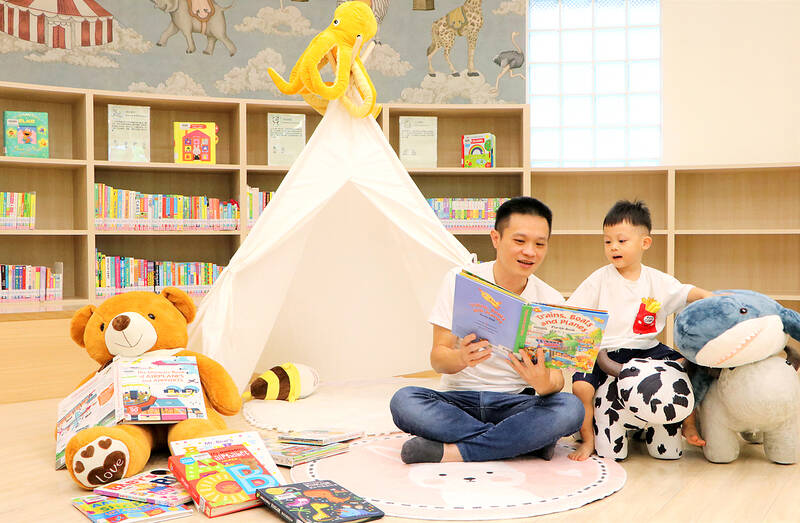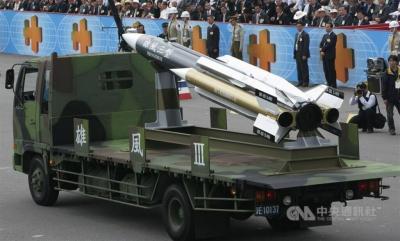About 74 percent of parents read together with their children before the age of one, a survey published by Hsin-Yi Foundation on Wednesday found.
The foundation publishes an annual survey on language development in children aged one to six.
During the COVID-19 pandemic, many academics expressed concern that wearing masks would hinder language development in young children. However, the survey found that Taiwanese parents had high confidence in their children’s language learning ability, foundation chairwoman Chang Sing-ju (張杏如) said.

Photo: Wong Yu-huang, Taipei Times
Parents reported that their children’s understanding, expressiveness and overall language ability was in line with normal development, and that their children showed the fastest progress in language development between the ages of 18 months and three years, the foundation said.
Parents reported that their children could communicate normally in daily contexts after the age of three, and that they gained strong proficiency in personal expression by the age of five, it said.
The survey also found that most parents actively interact with their children before the age of one, and that 88 percent of parents would immediately respond if their baby cries during that age.
The poll showed that 85 percent of parents regularly talked to their infants, and 80 percent said they would point to objects in front of their children and say the names of the objects.
“Daily conversations between parents and children, as well as singing and reciting nursery rhymes, and playing together are all important to language development,” the foundation said. “Reading together is also a common activity for families with young children, and is an important way for children to build up their vocabulary.”
The survey found that 98 percent of parents believe that reading together with their children is the best way to promote language development, it said.
“In fact, 74 percent of young children are introduced to books before they are a year old, and 44 percent of parents even start reading together with their children before they are six months old,” it said.
The foundation said it had worked with language and childcare experts to produce free reference material on language development for parents and caregivers of children up to eight years old.
Parents’ voices, expressions and body movements are not only a bridge for parent-child interaction, but also an important basis for children to learn to communication through language or imitating expressions, Chang said.
“The most important thing for parents to do is to create more opportunities for children to express themselves. You can make good use of picture books, toys and other interactive activities to provide opportunities for repeated practice,” she said.
The survey, conducted from Oct. 28 to Nov. 30 last year, collected 10,403 valid samples from parents with children aged one to six, the foundation said.

STATS: Taiwan’s average life expectancy of 80.77 years was lower than that of Japan, Singapore and South Korea, but higher than in China, Malaysia and Indonesia Taiwan’s average life expectancy last year increased to 80.77 years, but was still not back to its pre-COVID-19 pandemic peak of 81.32 years in 2020, the Ministry of the Interior said yesterday. The average life expectancy last year increased the 0.54 years from 2023, the ministry said in a statement. For men and women, the average life expectancy last year was 77.42 years and 84.30 years respectively, up 0.48 years and 0.56 years from the previous year. Taiwan’s average life expectancy peaked at 81.32 years in 2020, as the nation was relatively unaffected by the pandemic that year. The metric

Taiwan High Speed Rail Corp. (THSRC) plans to ease strained capacity during peak hours by introducing new fare rules restricting passengers traveling without reserved seats in 2026, company Chairman Shih Che (史哲) said Wednesday. THSRC needs to tackle its capacity issue because there have been several occasions where passengers holding tickets with reserved seats did not make it onto their train in stations packed with individuals traveling without a reserved seat, Shih told reporters in a joint interview in Taipei. Non-reserved seats allow travelers maximum flexibility, but it has led to issues relating to quality of service and safety concerns, especially during

A magnitude 5.1 earthquake struck Chiayi County at 4:37pm today, the Central Weather Administration (CWA) said. The hypocenter was 36.3km southeast of Chiayi County Hall at a depth of 10.4km, CWA data showed. There were no immediate reports of damage resulting from the quake. The intensity of the quake, which gauges the actual effect of a seismic event, measured 4 in Chiayi County, Tainan and Kaohsiung on Taiwan's seven-tier intensity scale, the data showed. The quake had an intensity of 3 in Chiayi City and Yunlin County, while it was measured as 2 in Pingtung, Taitung, Hualien, Changhua, Nantou and Penghu counties, the data

The Supreme Court today rejected an appeal filed by former Air Force officer Shih Chun-cheng (史濬程), convicted of Chinese Communist Party (CCP) espionage, finalizing his sentence at two years and two months for contravening the National Security Act (國家安全法). His other ruling, a ten-month sentence for an additional contravention, was meanwhile overturned and sent to the Taichung branch of the High Court for retrial, the Supreme Court said today. Prosecutors have been notified as Shih is considered a flight risk. Shih was recruited by Chinese Communist Party (CCP) intelligence officials after his retirement in 2008 and appointed as a supervisor